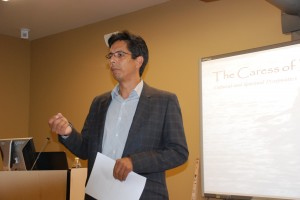
Article and photo by Jeannie Briones
John LaPointe, a Swinomish Tribal member, held a discussion at the Tulalip Hibulb Cultural Center on the Lushootseed language and how it is a crucial part of Native American heritage. The Coast Salish Lushootseed language is a link to the past, where stories are lived and retold from generations to generations, keeping Native American history and culture alive.
John, a graduate in Theology from the University of Washington, has spent a tremendous amount of time researching the Lushootseed language and understanding key words.
“Through this research, I have gained a profound understanding for this language,” said John.
The arrival of missionaries in 1838 to the Pacific Northwest introduced the Coast Salish people to the English language, and in turn the missionaries learned to speak Lushootseed. The missionaries also told stories of their culture and beliefs, stories the Native Americans found to be similar to their own culture and beliefs.
“I honestly believe the native people understood [these stories] better than some of the missionaries. They understood these stories ultimately aligned with who they are, that you love and care for each other no matter how hard or difficult times were,” said John.
John’s ancestor lived in a time when they took care of their people first before their own needs.
“In our culture today, with “pity,” there is an underlying implication of inferiority. ‘I am a little better than you, you pitiful thing.’ When they used the word, usebabtxw, even though it works in English it doesn’t work in a cultural context,” said John. “How would usebabtxw translate? Someone who is unfortunate and who needs our prayers is what usebabtxw means, they are not pitiful or below you, they are suffering through a hardship and they are in pain and need our prayers. It’s an extraordinary word.”
According to John, our Native American ancestors lived in a world with no political structure or authority, they cared for the poor and everyone was treated with respect.
“In their minds, the way they grew up, they had no concept of prejudice, they didn’t have categories,” John continued. “You lived in a society where nobody was homeless and hungry; why do you need government, why do you need police? We lived in a mad world; we lived in a world that was so crazy that we made sure everyone was taken care of.”
Our ancestors shared their food and resources; everyone helped each other and shared knowledge and wisdom. John described a Poltlatch ceremony.
“Potlatch was not a way to boast and brag how wealthy you were, it was a public demonstration of how you cared for the poor. We cared for usebabtxw, we gathered and we invited everybody,” said John.
By the early 1900’s, Native Americans were in the midst of the boarding school experience where they were forbidden to speak their language. Native Americans were forced to live on reservations and were stricken with poverty, but they found ways to benefit from the boarding schools.
“Learn everything you can and help your people because the old world is gone. It is a white man’s world now, you will never gain if don’t know the rules,” said John. “Our elders could see the wisdom in their teachings from another culture far away.”
In the mid 50’s, the decline of the Lushootseed language was evident. People who still spoke the language felt isolated in a changing world, and they were witnessing, the loss of their language and culture.
“Everything they [Native Americans] knew and lived for was disappearing, and they felt that when they died there would be no more Indians,” said John.
According to John there are recordings of the Lushstoodseed language that have been translated into English, restoring history and culture for future generations to hear and learn.
John was invited to the Hibulb Cultural Center as part of the lecture series on August 23rd. The next lecture series, on September 13th, features John McCoy; he will be discussing his life’s work. For more information and a schedule of upcoming events, visit their website at www.hibulbculturalcenter.org.
